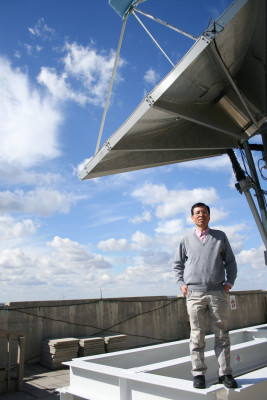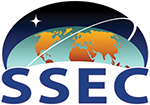Jun Li receives Chancellor’s Award for Excellence in Research

SSEC scientist Jun Li atop UW-Madison’s Atmospheric, Oceanic & Space Sciences building. Credit: Sarah Witman, SSEC.
This month, the University of Wisconsin-Madison honors nine academic staff members for their extraordinary and lasting contributions to the university in teaching, service, leadership, outreach, and research – contributions that extend well beyond the boundaries of the state.
Jun Li, a senior scientist at the Space Science and Engineering Center (SSEC), received the 2015 Chancellor’s Award for Excellence in Research as an independent investigator.
The award is presented annually to an independent investigator who has shown outstanding and diligent support of the university’s research mission. Li was selected from a competitive pool of nominees across the university, as scientists from all disciplines on campus are eligible for nomination.
Li is credited with a lifelong dedication to improving weather and climate forecasting through the advancement of remote-sensing technology – advances that are important to industry and individuals alike.
In just two decades at SSEC, Li’s achievements have been recognized by external organizations, starting with the National Oceanic and Atmospheric Administration (NOAA) David Johnson Award in 2002 for contributions to the nation’s environmental satellite program, and multiple awards from the National Aeronautics and Space Administration (NASA) for his involvement in the agency’s programs, from the Moderate-resolution Imaging Spectroradiometer (MODIS) to the Atmospheric Infrared Sounder (AIRS).
Li said he feels these accomplishments are indicative of a positive work environment at SSEC. The substantial support he receives from SSEC leadership as well as business services, the library, technical computing, and more, he said, are vital to his ability to focus and excel in his research.
“SSEC is a world-class organization,” he said. “Here, I have the opportunity to work with scientists of many different skill-sets and talents. The Center provides us with the tools and the freedom to follow our interests, develop ideas, and move forward toward a common vision.”
He added that he is especially thankful to his team, NOAA colleagues, and international collaborators for their efforts and hard work.
“I think of the award as representing the work of many others at SSEC, who are just as deserving. I am very appreciative of being nominated,” Li said. “In some ways, being recognized for my work and its value to the university means more than the award itself.”
From exploring new ways to more effectively extract satellite data, to helping develop more accurate forecasts through assimilating those satellite data in numerical weather prediction models, Li is always thinking years and decades ahead, and on a global scale.
That vision includes establishing and maintaining research relationships with satellite agencies in Europe as well as China. While the U.S. and China have a history of cooperation in the satellite meteorology sphere, Li is developing new partnerships with new technologies.
“Improving weather forecasts is global problem, so we need data everywhere,” he said. “Our research has many outcomes.”
One of Li’s former students, Fang Wang, now working at Colorado State University’s Cooperative Institute for Research in the Atmosphere, aptly characterizes her mentor’s recent achievement. Her words, included in the reception program, are reminiscent of both the SSEC mission and the Wisconsin Idea:
He once told me, “Our ideas and our work are not to keep, but to share. Sharing will not put us behind, but motivate us to think harder and work harder, so that we can always stay ahead.”
Historically, SSEC has been well represented in the Academic Staff Excellence Awards. Li joins the ranks of SSEC scientists Ed Eloranta, Larry Sromovsky, and Chris Velden, who were recipients of the research award in 1996, 2007, and 2012, respectively. Also, in 2002 and 2006, respectively, Wilton Sanders and Jean Phillips received the Chancellor’s Award for Excellence in Service to the University.
by Sarah Witman
